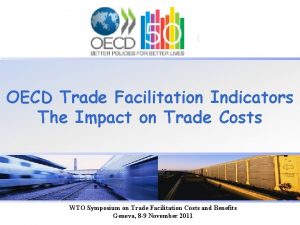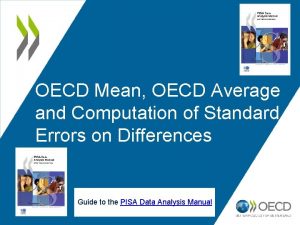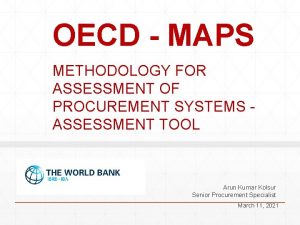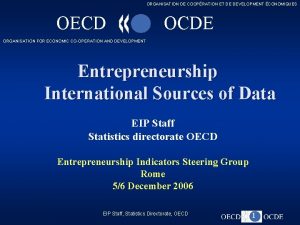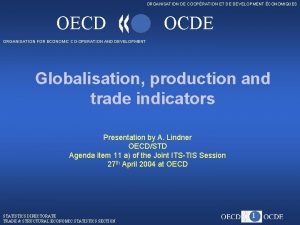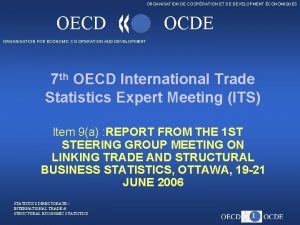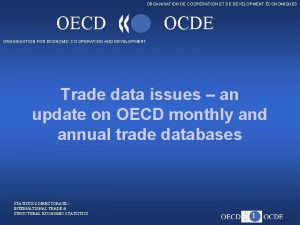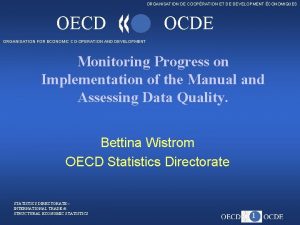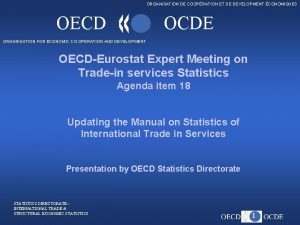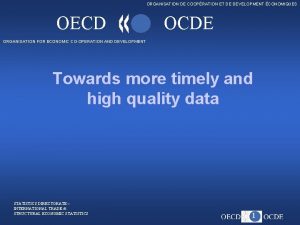ORGANISATION DE COOPRATION ET DE DEVELOPMENT CONOMIQUES OECD













- Slides: 13

ORGANISATION DE COOPÉRATION ET DE DEVELOPMENT ÉCONOMIQUES OECD OCDE ORGANISATION FOR ECONOMIC CO-OPERATION AND DEVELOPMENT Entrepreneurship International Sources of Data EIP Staff Statistics directorate OECD Entrepreneurship Indicators Steering Group Rome 5/6 December 2006 EIP Staff, Statistics Directorate, OECD 1

Collection of data Ø Ø Ø 2005: EIP Starts collecting data on entrepreneurship Entrepreneurship has driven interests from various organisations for a long time Link with economic growth and stability of economies Ex: EU Objective: foster entrepreneurship Definition of entrepreneurship; evolution and multiple facets (OECD definitions) Main elements for a definition: start-up rates and high growth EIP Staff, Statistics Directorate, OECD

List of various sources Ø Ø Nature of sources: private/ public sector, statistics, surveys List of international sources: 2 sets of data • World Bank • Global Entrepreneurship Monitor GEM • The European Union with two main surveys: Eurobarometer of the EC and Factors of Business Success for Eurostat • FORA: The National Agency for Enterprise and Construction’s Division for Research and Analysis EIP Staff, Statistics Directorate, OECD

List of various sources Ø Harmonisation of definitions: • EIM from Netherlands (harmonisation of selfemployment data) • OECD Directorates: - Statistics Directorate (business statistics and business demography statistics - STI Directorate ( ICCP Indicators: Innovation, R&D, investment) EIP Staff, Statistics Directorate, OECD

1. Doing Business Database Ø Study of business environment: law and regulations Ø Remove administrative burdens and create incentives World Bank Group 2. SME across the Globe: A new Database, 2003 Ø Measuring the SME sector: - New indicators: share of SMEs in the total labour force with 250 employees (consistent measure of firm size) - share of SMEs in the total labour force with 250 employees based on national definitions (100 to 500) - issues of comparability EIP Staff, Statistics Directorate, OECD

World Bank Group Ø Quality business environment indicator: aggregate measure of entry and exit costs, contract enforcement, property rights protection, business registration level, insolvency etc → Positive relationship business environment/ size of SME sector → An effective business environment generates growth EIP Staff, Statistics Directorate, OECD

World Bank Group 3. The importance of the business environment - Definition of entrepreneurship: “the effort an individual or a group makes to initiate an economic activity under a legal form of business within the formal sector - New data on entry rates and business density EIP Staff, Statistics Directorate, OECD

Global Entrepreneurship Monitor Ø Measure entrepreneurship and identify policies Ø Entrepreneurship as a life cycle ØMeasurement: • TEA: Total Entrepreneurship Activity -Nascent entrepreneurs ( less than 3 months) - New businesses (more than 3 months but less than 42) • Established businesses Ø Limits of the study - Sample issues - Opinion based indicators EIP Staff, Statistics Directorate, OECD

The European Union Eurobarometer: Entrepreneurship as personal fulfilment and social objectives. - April 2004, 29 countries and sample of ~ 20 000 people - Gathered data on “perception of entrepreneurship” in terms of preferences - Analysis of EU vs. USA - EU: employees, stability, security - USA: self employed, full achievement Ø EIP Staff, Statistics Directorate, OECD

The European Union Eurostat: The Factor of Business Success ( ISTAT Seminar) - 15 European countries, July 2005 - Jan 2006 - Determine the factors of success and growth of newly born enterprises, motivations for starting up one’s own business, barriers and risks - Questions on entrepreneurs profile, business characteristics (turnover and employees), business strategy. - Results released in November 2006 Ø EIP Staff, Statistics Directorate, OECD

EIM Ø Ø Specific work on Self Employment Data and Definitions financed by the Dutch Ministry of Economic Affairs Compendia Database: Uniformed data on Entrepreneurship for 23 countries over the period 19722002 Two-yearly data on the number of non agricultural business owners and the size of the labour force Based on OECD Labour Force Statistics readjusted EIP Staff, Statistics Directorate, OECD

OECD Directorates Ø Statistics Directorate, Business Statistics 3 databases - Business demography statistics: implementation of a framework and collaboration with Eurostat Ø Science, Technology and Industry (STI) Scoreboard 2005 Measures of output, labour input, investment and international trade by economic activity → productivity growth, competitiveness and general structural change. - → good indicator of entrepreneurial capacity of countries EIP Staff, Statistics Directorate, OECD

Conclusion Future Work: compilation of existing data → requires harmonisation of data Ø Gaps and Needs for international data Ø Establish priorities and new collection Ø QUESTIONS ? EIP Staff, Statistics Directorate, OECD









